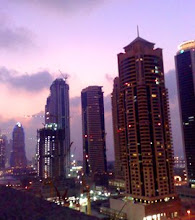The government of Umm Al Quwain says Tameer’s excuses for the failure of its flagship Al Salam City project are “lies that aim to impair the emirate's reputation”. Sources within the company say Tameer pressed on with
Thursday, May 29, 2008
From hero to zero
Wednesday, May 28, 2008
Premium airlines will fail if they sell on price
 Eos couldn’t make all-business work from
Eos couldn’t make all-business work from Elite Jets, in partnership with Jet Aviation, says it can compete with legacy carrier’s first class offers, running smaller jets off-schedule from points around the Gulf,
They may be right, and the venture has our best wishes, but at this level of the market it’s best not to hark on about price. The target audience – VIPs, CEOs and corporate execs – is much sought after, but doesn’t often pay for travel out of its own pocket. Who cares it it’s cheap, is it good? Plus, the legacy carriers’ loyalty schemes and air miles can be a lock-in.
Much better to promote the uniqueness of the service - the speed, the connectivity, the convenience, the club-like feel of being a airline industry pioneer. All the things the legacy carriers can’t buy.
Tuesday, May 27, 2008
What would oil at $200 mean for Dubai?
The cost of a barrel of oil is currently topping $130. There is now no shortage of experts who says $200 is on the horizon, claiming new supplies can’t (and won’t) ever match runaway demand. If it’s not $200, then most experts will agree that the era of cheap oil is over. It is an easy line to trip out, but what will it mean?
Monday, May 26, 2008
Radio advertising: cheap doesn’t mean value for money
 Radio advertising in the UAE offers the best value for money compared to other parts of the world, says the Arabian Radio Network. Well, they would, wouldn’t they? Emirates Business, owned by the Arab Media Group, says a radio spot on ARN, also owned by Arab Media Group, is as low as Dh275 to Dh500.
Radio advertising in the UAE offers the best value for money compared to other parts of the world, says the Arabian Radio Network. Well, they would, wouldn’t they? Emirates Business, owned by the Arab Media Group, says a radio spot on ARN, also owned by Arab Media Group, is as low as Dh275 to Dh500.Sunday, May 25, 2008
Good business shouldn’t tolerate missed deadlines
It is telling that the ‘revelation’ only one in five construction projects is likely to finish on time does not come as a shock. Shortages of materials and skilled workers (plus reams of red tape) are the official excuse, but the public has long since abandoned belief in deadlines being met.
Wednesday, May 21, 2008
Low-cost needs innovation, not bullying
Qatar Airways is hinting it may launch a low-cost carrier. The airline says it may need to respond to threats to its revenues from existing low-cost rivals; it could be operation in three months. Emirates has committed to its own low-cost airline within the year.
Tuesday, May 20, 2008
Interfering RTA plans background checks for carpooling
 The hyper-active RTA has another bee in its bonnet. Motorists must now register for a special license to carpool, with the RTA doing background checks on drivers and passengers. The aim, apparently, is to crack down on unlicensed taxis, but it smacks of the RTA exerting another level of control.
The hyper-active RTA has another bee in its bonnet. Motorists must now register for a special license to carpool, with the RTA doing background checks on drivers and passengers. The aim, apparently, is to crack down on unlicensed taxis, but it smacks of the RTA exerting another level of control.It is another case of the sledge hammer being used to crack a nut. Carpooling is already a harmless reality, one that should be encouraged rather than stigmatized. Does the RTA seriously expect thousands of commuters to go and register - and wait on another layer of bureaucracy?
A straw poll in this office suggests at least one in four have shared a lift with colleagues, around 10 per cent do so every day. Payment is often nothing more than a morning coffee.

